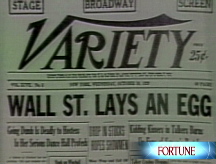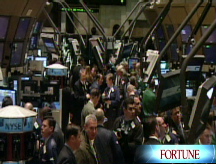This crisis could have a happy ending
Investor Daily: Yes, it sounds like pie-in-the-sky thinking right now. But there's reason to think good things are in store for investors.
NEW YORK (Fortune) -- I was thinking about the financial mess the other day and I came up with this theory. I'm wary of it because it's comforting, even uplifting, and by definition any economic supposition that has a happy ending is suspect. So with that caveat here goes:
I remember talking to a wise man at the end of the last decade who was pointing out to me how much the market had gone up during the 1990s and how stocks couldn't possibly continue to go up at that rate. The market's historical annual mean gain is about 8%, and yet between 1990 and 2000 the market had climbed some 15% per annum.
There is only one way to revert to the mean, the wise man pointed out, and that is for the market to go up less than that for quite some time. So we were looking at low single digit gains - or worse - for years.
But how could that be, I asked? Remember, the world looked pretty damn good back then. Sure tech stock prices were ridiculous, but other than that, what could possibly make the market tank? I have no idea, the wise man said, it's just very likely to happen.
And of course it did happen. First tech stocks crashed - and for sure, a few people saw that coming. But who envisioned the horror of 9/11 and its fallout? Who saw Enron, Worldcom and the wave of corporate scandals? Who saw Hurricane Katrina? And who saw this current financial meltdown. No one did. Back then our big concern was Y2K.
At the end of 1999 the Dow was around 11,400. Today the Dow is at 8,400, which means the index has fallen some 26%, a decline of almost 3% per year. With just one year left in this decade - even if 2009 is a humdinger - it is increasingly likely that first 10 years of this century will be one big washout for investors. A lost decade. (Just fyi, if the Dow had climbed up 8% a year from 11,400, the index would be over 22,000 now.) As for the Dow since 1990 - the entire 19-year period - the market has climbed on average some 6% per year.
So what does this mean for us going forward? Well, we don't really know, but we can make assumptions. First, at some point the carnage will end. The government and the markets will somehow figure a way out of this mess. Stabilization and confidence will return, and the economy will recover.
Second, at some point stock price returns will revert back up to the mean. In fact, to revert to the mean, stocks will at some point have to exceed the mean, in other words go up more than 8%. I know it could be years off, but you see my logic. It's just math.
And there's the rub. I believe that in order for the market to achieve a sustainable advance that is above the mean, we are due for some unforeseen positive event or events. Think about it. In the 1990s stocks went way up because of an unanticipated revolution in technology, i.e., networking and the Internet. In this decade we had a slew of unexpected negative events - bookended by 9/11 and this current meltdown. At some point, and it may be a few years from now, we will likely be subjected to an unforeseen positive.
What will it be? Of course no one knows. If we did, it would be priced in. But you could see how something like this might work. Take, for example, the discovery of a sustainable energy source or sources. You can see the incredible boost this would be to our economy and our markets. Imagine the geopolitical benefits. (And how it might defang our enemies.) Imagine the boost to our national psyche. And on and on.
I know you might think this is wishful thinking. And, of course, it is. Right now we are in for the toughest slog we've had in decades. We are going to have to sacrifice in unimaginable ways. It's probably even true that George Soros is right and that we are at the end of the era of American dominance. (That's okay. Who wants to dominate anyway?)
The bigger point is this: Somewhere over the horizon is an unrealized economic benefit that will lift us up in a way that right now, in the gloom, we can't even imagine. We have much work to do in the meantime, but some day it will come.
Looking for guidance in navigating these choppy markets? Let us know what topics you'd like us to cover and we'll try to address your questions in an upcoming Investor Daily. Please note: Fortune cannot give personalized advice on specific investments in your portfolio. ![]()
-
 The retail giant tops the Fortune 500 for the second year in a row. Who else made the list? More
The retail giant tops the Fortune 500 for the second year in a row. Who else made the list? More -
 This group of companies is all about social networking to connect with their customers. More
This group of companies is all about social networking to connect with their customers. More -
 The fight over the cholesterol medication is keeping a generic version from hitting the market. More
The fight over the cholesterol medication is keeping a generic version from hitting the market. More -
 Bin Laden may be dead, but the terrorist group he led doesn't need his money. More
Bin Laden may be dead, but the terrorist group he led doesn't need his money. More -
 U.S. real estate might be a mess, but in other parts of the world, home prices are jumping. More
U.S. real estate might be a mess, but in other parts of the world, home prices are jumping. More -
 Libya's output is a fraction of global production, but it's crucial to the nation's economy. More
Libya's output is a fraction of global production, but it's crucial to the nation's economy. More -
 Once rates start to rise, things could get ugly fast for our neighbors to the north. More
Once rates start to rise, things could get ugly fast for our neighbors to the north. More












